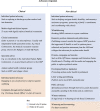Medical advocacy in the face of Australian immigration practices: A study of medical professionals defending the health rights of detained refugees and asylum seekers
- PMID: 32822404
- PMCID: PMC7442262
- DOI: 10.1371/journal.pone.0237776
Medical advocacy in the face of Australian immigration practices: A study of medical professionals defending the health rights of detained refugees and asylum seekers
Abstract
While medical advocacy is mandated as a core professional commitment in a growing number of ethical codes and medical training programs, medical advocacy and social justice engagement are regularly subordinated to traditional clinical responsibilities. This study aims to provide insight into factors that motivate clinician engagement and perseverance with medical advocacy, so as to inform attempts by policymakers, leaders and educators to promote advocacy practices in medicine. Furthermore, this study aims to provide an analysis of the role of medical advocates in systems where patients' rights are perceived to be infringed and consider how we might best support and protect these medical advocates as a profession, by exploring the experiences and perspectives of Australian clinicians defending the health of detained asylum seekers. In this qualitative study thirty-two medical and health professionals advocating on asylum seeker health in immigration detention were interviewed. Transcripts were coded both inductively and deductively from interview question domains and thematically analysed. Findings suggested that respondents' motivations for advocacy stemmed from deeply intertwined professional and personal ethics. Overall, advocacy responses originated from the union of three integral stimuli: personal ethics, proximity and readiness. We conclude that each of these three integral factors must be addressed in any attempt to foster advocacy within the medical profession. In light of current global trends of increasingly protectionist immigration practices, promoting effective physician advocacy may become essential in ensuring patients' universal right to health.
Conflict of interest statement
The authors have declared that no competing interests exist.
Figures




Similar articles
-
Seeking asylum in Australia: immigration detention, human rights and mental health care.Australas Psychiatry. 2013 Aug;21(4):315-20. doi: 10.1177/1039856213491991. Epub 2013 Jun 26. Australas Psychiatry. 2013. PMID: 23804113 Review.
-
Ethical and professional considerations providing medical evaluation and care to refugee asylum seekers.Am J Bioeth. 2013;13(7):3-12. doi: 10.1080/15265161.2013.794876. Am J Bioeth. 2013. PMID: 23767428
-
Do codes of ethics and position statements help guide ethical decision making in Australian immigration detention centres?BMC Med Ethics. 2019 Jul 23;20(1):52. doi: 10.1186/s12910-019-0392-8. BMC Med Ethics. 2019. PMID: 31337376 Free PMC article.
-
The need for a rights-based public health approach to Australian asylum seeker health.Public Health Rev. 2016 Aug 22;37:6. doi: 10.1186/s40985-016-0020-9. eCollection 2016. Public Health Rev. 2016. PMID: 29450048 Free PMC article. Review.
-
Nursing in asylum seeker detention in Australia: care, rights and witnessing.J Med Ethics. 2009 Sep;35(9):546-51. doi: 10.1136/jme.2009.029827. J Med Ethics. 2009. PMID: 19717693
Cited by
-
Knowledge, attitude and practice of pediatric healthcare staff towards the therapy for patients with congenital heart disease.BMC Med Educ. 2024 Nov 14;24(1):1312. doi: 10.1186/s12909-024-06305-1. BMC Med Educ. 2024. PMID: 39543572 Free PMC article.
References
-
- Medical Board of Australia. Good Medical Practice: A Code of Conduct for Doctors in Australia. 2014. - PubMed
MeSH terms
LinkOut - more resources
Full Text Sources

